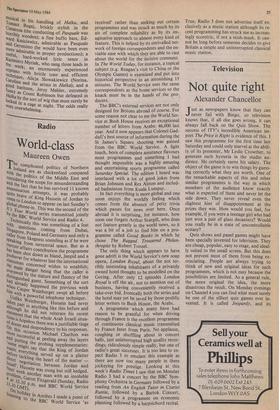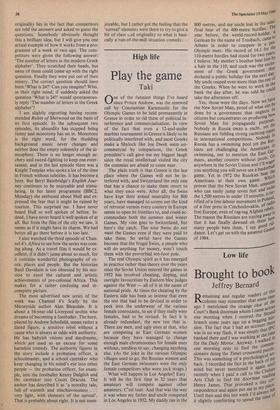Television
Not quite right
Alexander Chancellor
Just as newspapers know that they can never fail with Bingo, so television knows that, if all else goes wrong, it can always fall back on the Quiz Show. The success of ITV's incredible American im- port The Price is Right is evidence of this. I saw this programme for the first time last Saturday and could only marvel at the abili- ty of its presenter, Mr Leslie Crowther, to generate such hysteria in the studio au- dience. He certainly earns his salary. The object of the game is to win things by guess- ing correctly what they are worth. One of the remarkable aspects of this and other similar programmes is the way in which members of the audience know exactly what is expected of them and never let the side down. They never reveal even the slightest hint of disappointment at the prizes they win. How would you feel, for example, if you were a teenage girl who had just won a pair of glass decanters? Would you really be in a state of uncontrollable ecstasy?
Quiz shows and panel games might have been specially invented for television. They are cheap, popular, easy to stage, and ideal- ly suited to the small screen. But this does not prevent most of them from being ex- cruciating. People are always trying to think of new and original ideas for such programmes, which is not easy because the possibilities are limited. As a general rule, the more original the idea, the more disastrous the result. On Monday evenings on Channel 4 you can find what must surely be one of the silliest quiz games ever in- vented. It is called Jeopardy, and its
originality lies in the fact that competitors are told the answers and asked to guess the questions. Somebody obviously thought this a brilliant idea, but I will give you one actual example of how it works from a pro- gramme of a week or two ago. The com- petitors were given the following answer: `The number of letters in the modern Greek alphabet'. They scratched their heads, but none of them could come up with the right question. Finally they were put out of their misery. The correct question should have been 'What is 24?' Can you imagine? Who, in their right mind, if suddenly asked the question 'What is 24?' would spontaneous- ly reply 'The number of letters in the Greek alphabet'?
I am slightly regretting having recom- mended Robin of Sherwood on the basis of its first episode. In the subsequent two episodes, its absurdity has stopped being funny and monotony has set in. Monotony is the right word, for the thudding background music never changes and neither does the empty solemnity of the at- mosphere. There is no longer enough ar- chery and sword-fighting to keep one enter- tained, and in the last episode there was a Knight Templar who spoke a lot of the time in French without subtitles. It has become a bore. But Beryl Bainbridge's English Jour- ney continues to be enjoyable and stimu- lating. In her latest programme (BBC2, Monday) she enthused about Hull and ex- pressed the fear that it might be ruined by tourism. This surprised me. I have never heard Hull so well spoken of before. In- deed, 1 have never heard it well spoken of at all. But from the film of the city we saw, it seems as if it might have its charm. We had better all go there before it is too late.
I also watched the third episode of Chan- nel 4's Africa to see how the series was com- ing along. As a travel film it would be ex- cellent, if it didn't jump about so much, for it contains wonderful photography of ex- otic places and people. But the historian Basil Davidson is too obsessed by his mis- sion to extol the cultural and artistic achievements of pre-colonial Africa. This makes for a rather confusing and in- complete picture.
The most advertised new series of the week was Channel 4's Scully by the Merseyside author Alan Bleasdale. It is about a 16-year-old Liverpool urchin who dreams of becoming a footballer. The hero, played by Andrew Schofield, seems rather a dated figure, a sensitive rebel without a cause who is always at odds with authority. He has babyish visions and daydreams, which are used as an excuse for some harmless comedy. The authority figures in the story include a probation officer, a schoolmaster, and a school caretaker who keep changing in his mind's eye into other people — the probation officer, for exam- ple, into the footballer Kenny Dalglish and the caretaker into Count Dracula. The author has described it as 'a morality tale, full of warmth and mischievousness . . . very light, with elements of the surreal'. That is probably about right. It is not unen-
joyable, but I rather got the feeling that the `surreal' elements were there to try to give a bit of class t,.id originality to what is basi- cally a run-of-the-mill situation comedy.















































 Previous page
Previous page